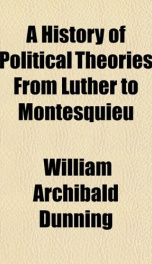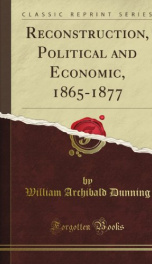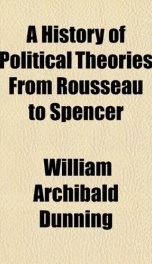a history of political theories from luther to montesquieu

Purchase of this book includes free trial access to www.million-books.com where you can read more than a million books for free. This is an OCR edition with typos. Excerpt from book: asserted, that the commerce and intercourse of mankind, which are of such mighty advantage, can have no security where men pay no regard to their engagements. In like manner, may it be said, that men could not live at all in society, at least in a civilized society, without laws and magistrates and judges, to prevent the encroachments of the strong upon the weak, of the violent upon the just and equitable. The obligation to allegiance being of like force and authority with the obligation to fidelity, we gain nothing by resolving the one into the other. The general interests or necessities of society are sufficient to establish both. If the reason be asked of that obedience, which we are bound to pay to government, I readily answer, because society could not otherwise subsist: And this answer is clear and intelligible to all mankind. Your answer is, because we should keep our word. But besides, that no body, till trained in a philosophical system, can either comprehend or relish this answer: Besides this, I say, you find yourself embarrassed, when it is asked, why we are bound to keep our word 1 Nor can you give any answer, but what would, immediately, without any circuit, have accounted for our obligation to allegiance.1 In these words Hume announced the doctrine which, transmitted through Bentham and the distinguished line of English utilitarians, was in the nineteenth century to play a decisive part in wresting from the contract theory its century-long dominion over the realm of political theory. 4. Italian Theory: Vico The Italian representative of the transition period with which we are dealing, Gian Battista Vico (1668- 1744), has a significance in the history of political theories only as an exponent of the historical method 1 Essays, Vol. I, pp. 455-456. ...
Info about the book
Author:
Series:
Unknown
ISBN:
0039102831
Rating:
3/5 (1)Your rating:
0/5
Languge:
English
Users who have this book
Users who want this book
What readers are saying
What do you think? Write your own comment on this book!
write a commentif you like a history of political theories from luther to montesquieu try:
Do you want to read a book that interests you? It’s EASY!
Create an account and send a request for reading to other users on the Webpage of the book!





